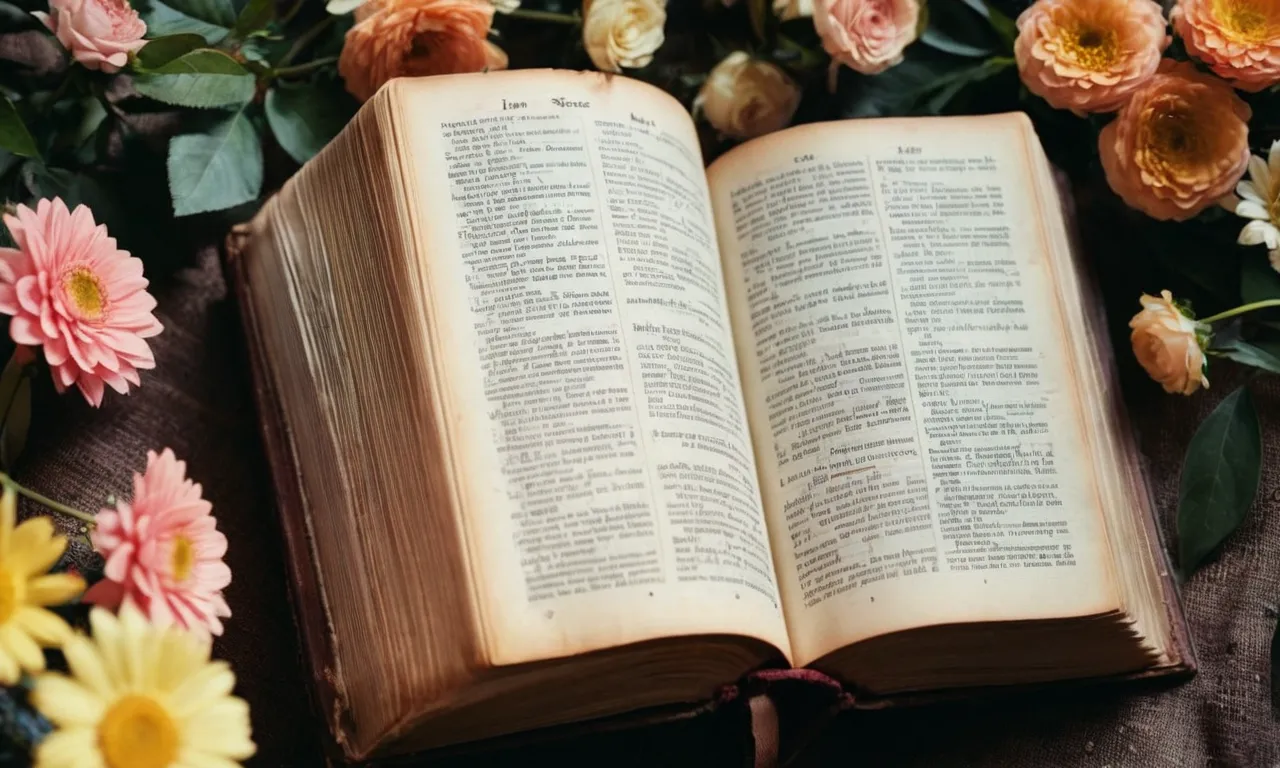How Many Wives Did Jacob Have In The Bible?
The story of Jacob and his wives in the Bible provides insight into ancient marriage customs and God’s providence. If you’re short on time, here’s a quick answer to your question: Jacob had four wives – Leah, Rachel, Bilhah and Zilpah.
In this comprehensive article, we will examine Jacob’s life and marriages in depth. We will cover how many wives he had, the reasons he took multiple wives, the complex dynamics between them, and what we can learn from this account today about God’s faithfulness.
Jacob’s Background and God’s Promise of Blessing
As the son of Isaac and grandson of Abraham, Jacob was part of God’s covenant family. Though he was not the oldest son, Jacob managed to gain the birthright and blessing that would have gone to his older brother Esau. This resulted in family conflict, yet God still had great plans for Jacob.
Jacob’s place as son of Isaac and grandson of Abraham
Jacob was one of two sons born to Isaac and Rebekah, Abraham’s son and daughter-in-law. This connected Jacob directly to God’s covenant with Abraham, which promised that Abraham’s descendants would become a great nation and be a blessing to all peoples (Genesis 12:1-3).
As Abraham’s grandson, Jacob was an heir to this covenant promise.
Jacob’s character and deception to gain blessing
Though Jacob was chosen by God, he had a tendency toward deception. He persuaded Esau to sell his birthright for a bowl of stew (Genesis 25:29-34). Jacob later deceived his blind father Isaac into giving him Esau’s blessing as firstborn son (Genesis 27:1-29).
This blessing entitled Jacob to a double portion of inheritance and affirmation as leader of the family after Isaac died.
Jacob’s deception caused great family strife. Esau was furious and planned to kill Jacob (Genesis 27:41). At his mother Rebekah’s urging, Jacob fled from his angry brother, leaving his homeland. For much of his early life, Jacob faced the consequences of his lies and trickery within his family.
God’s unconditional promise to make a great nation from Jacob
Despite Jacob’s questionable character, God had chosen him for divine blessing. The Lord confirmed to Jacob the same covenant promise He had given Abraham and Isaac, to make him into a great nation and bless all families of the earth through him (Genesis 28:13-15).
This calling was based on God’s sovereign choice, not Jacob’s merit.
God later changed Jacob’s name to Israel (Genesis 32:28), representing the new identity and purpose He had given Jacob and his descendants. They would inherit the land of Canaan as God’s people, the nation of Israel.
The Lord accomplished His covenant plan not through human perfection, but by His unconditional grace toward an undeserving people.
Jacob’s Marriage to Leah and Rachel
Jacob’s journey to his uncle Laban’s household
After Jacob deceived his father Isaac into giving him the blessing meant for his older brother Esau, he fled to the household of his uncle Laban to avoid Esau’s wrath (Genesis 27-28). When Jacob arrived in Paddan Aram, he met Rachel, one of Laban’s daughters, while she was tending her father’s sheep.
Jacob was instantly smitten with Rachel’s beauty and fell in love with her (Genesis 29:9-11).
Custom of marrying cousin
At that time, it was customary for cousins to marry each other. Laban was Jacob’s mother Rebekah’s brother, making Rachel and Leah Jacob’s first cousins (Genesis 24:15). Marrying close relatives maintained wealth and land within families in that culture.
Though marrying cousins seems strange today, it was commonplace and even expected in Old Testament times.
Laban’s deception – Jacob marries Leah first
After staying with Laban for a month and helping tend the flocks, Jacob asked to marry Rachel. Laban agreed but tricked Jacob on his wedding night by having him marry his older daughter Leah instead. Back then, the bride’s face was veiled until after the marriage was consummated.
So it was not until morning that Jacob realized he had married the wrong sister! (Genesis 29:21-25).
Laban explained that in their culture, the older daughter had to marry before the younger. He told Jacob he could still marry Rachel, but only if he worked another seven years for Laban (Genesis 29:26-27).
So in exchange for Rachel’s hand in marriage, Jacob had to commit to working for his scheming uncle for a total of 14 years!
Jacob marries Rachel one week later
After agreeing to Laban’s terms, Jacob married Rachel just one week after marrying Leah (Genesis 29:28). Jacob clearly favored Rachel and loved her more than Leah. But God saw that Leah was unloved, so he blessed her with children while Rachel initially remained barren (Genesis 29:31).
Over the years Jacob fathered 12 sons and one daughter with his two wives as well as their maidservants. His dozen sons would go on to become the ancestors of the 12 tribes of Israel.
Bilhah and Zilpah – Concubines or Wives
Social context of concubinage
In ancient Near Eastern societies, concubinage was a common practice that allowed men to take secondary wives of lower social status. These concubines did not have the same rights and protections as primary wives, but still bore children for their masters.
In the biblical account, both Bilhah and Zilpah seem to occupy this role in Jacob’s household.
As Rachel and Leah’s personal maidservants, Bilhah and Zilpah would have been considered property under the patriarchal system of the time. When Rachel and Leah directed Bilhah and Zilpah to have children with Jacob on their behalf, they were asserting control over their maidservants’ reproductive capacity to compete with one another in bearing sons for their shared husband.
Rachel and Leah’s competition to bear children
The story of Bilhah and Zilpah arises from the intense rivalry between Jacob’s two primary wives, sisters Rachel and Leah. Though Jacob loved Rachel more, God allowed Leah to conceive first while Rachel remained barren.
Desperate for children of her own, Rachel offered her maid Bilhah to Jacob and said:
“Here is my servant Bilhah. Sleep with her, so that she may bear sons for me and that through her I too may build a family.” (Genesis 30:3).
When Bilhah conceived and bore Jacob’s son Dan, Rachel declared triumphantly “God has vindicated me! He has heard my plea and given me a son.” (Genesis 30:6). Not to be outdone, Leah then presented her maid Zilpah to Jacob, who also bore him a son named Gad.
Bilhah and Zilpah take on wives’ role and bear sons
Though considered concubines and referred to as “servants”, Bilhah and Zilpah engaged in marital relations with Jacob at the behest of his wives Rachel and Leah. In this sense, they took on several wifely duties typically reserved for primary spouses at the time:
- Bore children who would carry on Jacob’s line and inherit land
- Provided Leah and Rachel a means to compete over bearing progeny
- Enabled Rachel and Leah to assert control as “female household heads” in directing their fates
In all, Bilhah bore Jacob two sons – Dan and Naphtali, while Zilpah bore him Gad and Asher. These sons were counted among the progenitors of the twelve tribes of Israel, suggesting they were regarded as legitimate heirs despite the status of their mothers.
So while Bilhah and Zilpah were considred concubines, they also fulfilled critical wifely functions for Jacob. Their story illustrates the complexity of marital relations in ancient Near Eastern cultures.
Complex Family Dynamics and Dysfunction
Favoritism towards Rachel and Joseph
Jacob’s love for Rachel over Leah led to favoritism and conflict in the family. Though Leah bore Jacob’s first four sons, he clearly favored Rachel and the sons she bore him, Joseph and Benjamin (Genesis 29:30-35).
This favoritism created jealousy and rivalry between the sisters that carried on through their children.
Later in life, Jacob favored his son Joseph over his other sons since Joseph was Rachel’s firstborn. Jacob gave Joseph a coat of many colors, signifying his favoritism (Genesis 37:3). This caused jealousy and anger in Joseph’s brothers, driving them to eventually sell Joseph into slavery in Egypt (Genesis 37:18-36).
Jealousy and conflict between sisters
The favoritism Jacob showed towards Rachel created intense jealousy and competition between the two sister wives. Leah felt unloved and unseen, while Rachel was angry she could not conceive at first (Genesis 30:1-2).
Their rivalry manifested through the use of their maidservants, Bilhah and Zilpah, as surrogates in a childbearing contest to win Jacob’s affection.
The sisters also showed their jealousy through the names they gave their children. Leah used names like Reuben (“See, a son! “), hoping it would make Jacob finally love her (Genesis 29:32). Rachel named her son Joseph (“May he add”), requesting God grant her another son so she could match Leah’s four (Genesis 30:24).
Effects on Jacob’s twelve sons
The favoritism and rivalry between Jacob’s wives carried over to their children. There was animosity and discord between Leah’s first four sons and Rachel’s two sons, Joseph and Benjamin. Their dysfunctional family dynamics shaped them profoundly.
For example, when Joseph shared his dreams of ruling over his brothers, their jealousy intensified (Genesis 37:11). Later, the 10 eldest brothers’ hatred boiled over when they plotted to kill Joseph, then opted to sell him as a slave instead (Genesis 37:18-28).
The favoritism and jealousy plaguing Jacob’s family reveals the painful dysfunction and its far-reaching effects.
God’s Faithfulness Despite Human Failings
The Bible teaches that God remains faithful to His promises, even when His people fail Him. This truth is powerfully illustrated in the life of Jacob, one of the patriarchs of Israel.
God builds the nation of Israel through Jacob
Jacob was the son of Isaac and the grandson of Abraham. God had promised Abraham that he would become the father of a great nation, and this promise was passed down to Isaac and then Jacob (Genesis 12:1-3). However, Jacob was far from perfect.
He cheated his brother Esau out of his birthright and blessing (Genesis 27). Because of this, Jacob had to flee from his homeland.
Yet despite Jacob’s deception, God still used him to fulfill His promises. While in exile, Jacob had 12 sons who became the 12 tribes of Israel (Genesis 29:31-30:24). God also reiterated His covenant with Jacob, promising to give his descendants the land of Canaan (Genesis 28:13-15).
Though Jacob had failed, God remained faithful to him and blessed him.
God remains faithful to His promises
Jacob’s life illustrates a consistent pattern in Scripture – human sinfulness and divine faithfulness. Though God’s people repeatedly break faith with Him, God keeps His promises. He is patient, forgiving, and gracious.
As the prophet Micah declared, “Who is a God like you, who pardons sin and forgives the transgression of the remnant of his inheritance? You do not stay angry forever but delight to show mercy” (Micah 7:18).
Jacob provides a wonderful example of God’s patience. Despite Jacob’s deception and selfishness, God did not reject him but continued to protect him and bless him. God’s faithfulness was not dependent on Jacob’s performance. This theme recurs throughout the Old Testament.
Though Israel turned away from God again and again, He remained faithful to them, calling them back to Himself.
Lessons for readers today about God’s sovereignty
Jacob’s story contains valuable lessons for believers today. First, it is reassuring. No matter how badly we mess up, God does not break His promises to us. His love is steadfast and His mercy endures forever (Psalm 136:1). Second, it is humbling.
Since salvation does not depend on our good behavior, there is no place for pride or self-righteousness. We are called to humility and gratitude for God’s grace.
Finally, Jacob’s story affirms God’s sovereignty. Despite Jacob’s schemes, it was God who directed the course of his life. Similarly, believers can take comfort that their lives are in God’s hands. As Romans 8:28 declares, “And we know that in all things God works for the good of those who love him, who have been called according to his purpose.”
No matter what happens, God’s plans cannot be thwarted.
Conclusion
In conclusion, Jacob had a total of four wives – two principal wives, Leah and Rachel, and two concubines, Bilhah and Zilpah, who took on roles of wives. This came about due to cultural practices of the time and difficult family dynamics.
While far from ideal, God displayed His faithfulness by working through and in spite of human mistakes and sins. Jacob’s twelve sons fathered the twelve tribes of Israel, fulfilling God’s unconditional blessing upon Abraham’s descendants.








